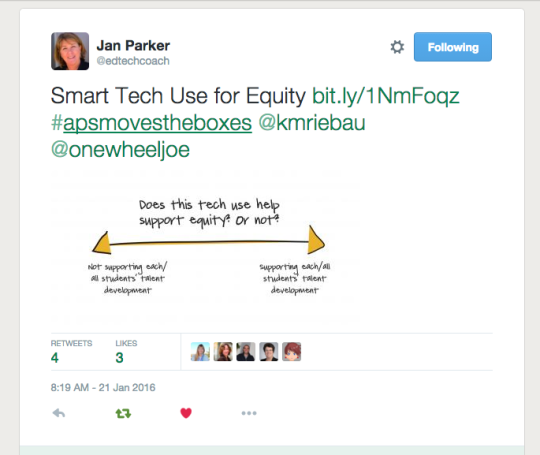 This photograph won the World Press Photo of the Year award in 2014. The men in the picture are African migrants standing on a shoreline in Djibouti City hoping to use a cell signal from neighboring Somalia in order to connect with their relatives. It just seemed to belong here in the margins as this school writes about its concerns for parents and families.
This photograph won the World Press Photo of the Year award in 2014. The men in the picture are African migrants standing on a shoreline in Djibouti City hoping to use a cell signal from neighboring Somalia in order to connect with their relatives. It just seemed to belong here in the margins as this school writes about its concerns for parents and families.
Speaking of minority parents and families, another issue of equity is that Latino and African American families are more likely to use cell phones at home for Internet access than their white counterparts, who are more likely to have broadband access. By vilifying cell phones, the school unwittingly condemns the mode of access that most of the families they serve use.
In "Mobile Phones and America's Learning Divide," S Craig Watkins from the University of Texas at Austin- an education researcher- poses powerful inquiry questions about mobile devices and their potential for closing achievement gaps. Here's hoping that this school identifies inquiry questions to supplant the over-reaching and poorly supported claims of this policy. Watkins' work should be required reading for these (unnamed) authors. They can ban cell phones all they want but citing popular press and tangential research to do so is a dubious act for a learning institution in the 21st Century.

 This photograph won the World Press Photo of the Year award in 2014. The men in the picture are African migrants standing on a shoreline in Djibouti City hoping to use a cell signal from neighboring Somalia in order to connect with their relatives. It just seemed to belong here in the margins as this school writes about its concerns for parents and families.
This photograph won the World Press Photo of the Year award in 2014. The men in the picture are African migrants standing on a shoreline in Djibouti City hoping to use a cell signal from neighboring Somalia in order to connect with their relatives. It just seemed to belong here in the margins as this school writes about its concerns for parents and families.